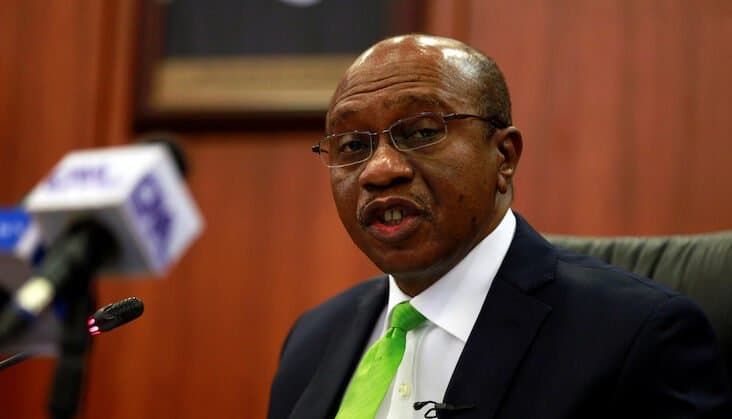The Central Bank of Nigeria last month hiked its main lending rate by 150 basis points to 15.50%, its highest level yet, forging ahead with efforts to rein in inflation and ease pressure on the currency.
But with inflation at its highest in 17 years, Central Bank of Nigeria Governor Godwin Emefiele said the Monetary Policy Committee had to continue with an aggressive stance.
- APC crisis: ‘Sacked’ directors accuse Adamu of withdrawing N3bn from ‘secret’ accounts
- Smuggling of migrants threat to economy — NIS
Annual inflation rose for a seventh straight month in August to 20.52% from 19.64% in July.
The latest rate hike, the third in a row, means the central bank has delivered a total 400 basis-point increase this year, its most hawkish in a single cycle, analysts said.
Emefiele said: “The MPC noted that a tight policy stance would help consolidate the impact of the last two policy rate hikes, which is already reflected in the slowing growth rate of money supply.”
“It also felt that an aggressive rate hike would slow capital outflows and likely attract capital inflows and appreciate the naira currency
The Move by the CBN is consistent with Central banks globally who are faced with high inflation and are tightening monetary policy rapidly to damp demand and bring it into alignment with supply.
Owing to this, many central banks around the world have pivoted monetary policy in order to maintain anchored expectations as Russia’s invasion of Ukraine early this year heightens risks across the world.
Clearly, the eight-month war is exerting a drag on the global economy, as it has led to the surge in energy and food prices, currently driving a galloping inflation rate and weighing on economic growth.
At a global level, monetary policy tightening is also proceeding at a rapid pace by historical standards.
Emefiele had said the MPC was concerned that within a four-month period, inflation had accelerated aggressively by 280 basis points, from 17.7 per cent in May to 20.5 per cent.
He said the decision to raise interest rate was unanimously agreed by members of the committee in order to narrow the negative real interest rate gap and hold back inflation.
Unfortunately, this comes at a time when Nigeria’s fiscal authorities are under intense pressure due to significant revenue cut.
Today, Nigeria’s debt service cost presently outweighs its revenue, with the payment for petrol subsidy which runs into trillions of naira now exceeding total revenues from sales of crude oil and gas and unprecedented level of crude oil theft, which is Nigeria’s major source of foreign exchange earnings. All these places a heavy burden on the shoulders of the monetary policy authorities in the country.
Fiscal authority must argument monetary effort
The National President of the National Association of Nigerian Traders (NANTS), Barr Ken Ukoaha said: “Our fiscal authorities must encourage foreign direct investment. We need to reduce the demand on forex by patronising locally produced goods, utilising local health care institutions and schools.”
He said the government must make effort to reduce the incidence of capital flight, eliminate payment arrears and encourage local input.
“Exchange rate regimes have not been able to achieve their objectives due to the non-diversified economy. So we need to look inward for solutions that would revive the economy,” Ukaoha added.
Speaking in the same vein, the International Monetary Fund (IMF) has advised the CBN and other monetary policy authorities to continue to adopt traditional tools in fighting galloping inflation which has remained a concern to policy makers across the globe.
In addition, the Washington-based institution called for stronger fiscal and monetary policy collaboration to cage inflation in Nigeria.
The Divisional Chief Research Department, Daniel Leigh, IMF said: “For Nigeria, in particular, we forecast inflation at about 19 per cent this year, but then some moderation next year down to 17 per cent, and part of that does reflect the monetary policy actions by Nigeria’s Central Bank as well as the decline that we expect in oil and food prices globally.”
Also commenting on the best approach for the CBN and other central banks in Africa to fight inflation, the Chief Economist and Director Research Department IMF, Pierre-Olivier Gourinchas said: “Our advice, in general, is that central banks should first start with the traditional instruments of monetary policy and as you want to think about non-conventional instruments then you should think about what is the friction that is preventing the conventional monetary policy from working it will require a country or a central bank to deploy alternative ways of charting a course for monetary policy.”
On his part, the Director Monetary and Capital Markets Department, IMF, Tobias Adrian, stressed the need for fiscal and monetary policies to work hand in hand towards reining in inflation as well as promoting inclusive and sustainable growth.
Adrian said: “Food prices and commodity prices have hit many sub-Saharan African countries very hard as most of the countries are importers of food.
“In particular, this comes on top of the previous crisis. The COVID-19 crisis is already in Sub-Saharan Africa and now we have this rise in commodity prices and of course, the tightening of global financial conditions that we already discussed.
“So many countries are already in debt distress or close to debt with high vulnerabilities. You know, addressing those debt issues is very high and that has triggered a tightening of monetary policy.”
To the Managing Director, IMF, Kristalina Georgieva, at a time like this, there was the urgent need to support low-income countries who have huge debt burdens in order to avert an impending food crisis.
She explained: “We also must support vulnerable emerging markets and developing countries. It is tough for everybody, but it is even tougher for countries that are now being hit by a stronger dollar, high borrowing costs, and capital outflows.
“A triple blow that is particularly heavy for countries that are under a high level of debt. So zeroing in on this for low-income countries where over 60 per cent are at or near debt distress is paramount. And we need stronger efforts to confront food insecurity.
“In all, 345 million people are acutely food insecure. What it means is that there are children and women and men are at risk of dying because of hunger.”
“We must act now to safeguard financial stability, particularly as we see rising financial sector risks. Macro-prudential policies need to be even more vigilant and proactively address pockets of vulnerability,” she added.
Divisional Chief, Fiscal Affairs Department IMF, Paulo Medas, also stressed the need for more responsible fiscal measures to be taken by countries in the continent.
Medas pointed out that Nigeria ought to be benefiting from higher oil revenues, noting however that, “we haven’t seen an improvement as we hoped because of the large energy subsidies, but also other issues with the production of oil and other pressures on the budget.”
Expert urge joint effort as floods threaten Nigeria’s food security
As the yuletide season approaches, the price of rice in Nigeria has risen to a record high of N42,000 per 50kg bag on average.
This is as Nigerians have been grappling with sustained food crises over the years due to supply chain disruptions, insecurity, and low farm yields.
The recent flooding incidents in some parts of the country have exacerbated the situation, threatening to send food inflation soaring even more.
Director General at the Nigerian Association of Chambers of Commerce, Industry, Mines, and Agriculture (NACCIMA), Sola Obadimu said the traders are now panic-buying rice in a bid to hedge against possible inflation as we head into the festive period.
He noted that the flooding has exacerbated Nigeria’s underlying infrastructural problems, bordering on insecurity, weak infrastructure, and persistent inflation rate, causing a surge in the prices of rice.
He said Impact-based actions must be taken by the federal and state governments to ensure food security in the country, considering that Nigerians spend over 50% of their household expenditure on food according to the latest NBS estimates. This means, if this crisis should linger, it could throw more Nigerians far below the poverty line.

 Join Daily Trust WhatsApp Community For Quick Access To News and Happenings Around You.
Join Daily Trust WhatsApp Community For Quick Access To News and Happenings Around You.



